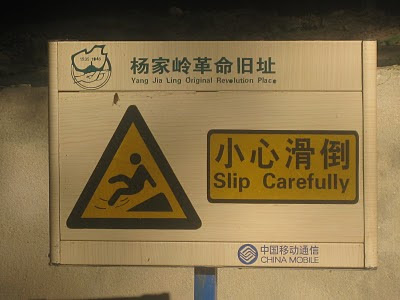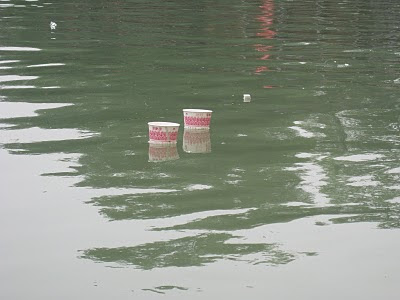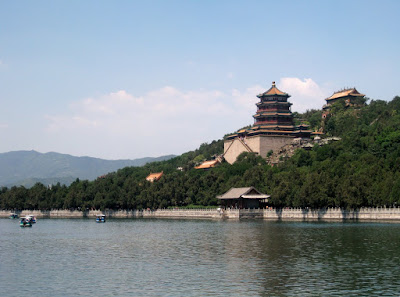While I was in Changsha, I had the pleasure of visiting Yali Middle School, which is one of the most selective high schools in Hunan Province. What's so special about Yali, you ask? Well, it was founded more than 100 years ago by Yale-in-China, now known as the Yale-China Association.
The school is known for its excellent English education, as the English teachers are Yale graduates who receive a two year fellowship to teach at Yali. I met one of the Yale fellows who graciously gave me a tour of the campus.
The School
Yali has an open campus, with a main gate and separate buildings for athletic facilities, libraries, classrooms, and dorms (it's a boarding school).
I already mentioned that Yali is famous for its English education. Recently, in addition to having standard English classes, it has also added specialized English courses such as theater and writing.
Yali is also unique compared to similarly ranked Chinese high schools because it offers an abundance of extracurricular activities. To my knowledge, the typical Chinese high school student does not really get to engage in many activities because he or she must focus on academics and the big college examination. However, Yali makes sure its students are well-rounded. There is student government, environmental clubs, etc.
Similar to other schools in the area, the students are divided up into classes by their grades (grades as in scores). Therefore, all the best students are in the same classes and the "worst" students are in the same classes. Though this is extremely controversial, I can see how it would make teaching instruction easier, as students are grouped by ability level.
Unlike schools here, students are in the same classroom with the same classmates the whole day while the teachers are the ones that have to shift around. Classes are 40 minutes each. Though the school day is longer, students have a lunch break of 2 hours.
The Students
No doubt about it - the students here are the cream of the crop! Many of them apply and get into the top universities in China as well as around the world.
The teaching fellow who gave me a tour told me his view of Chinese students. He believes that compared to American students, Chinese students are at a higher intellectual level (at least the ones at Yali). I can understand this - they spend so much more time on academics. They start high level math at a very young age. At my cousin's age, I would not have been able to comprehend the calculus she is now working on. Now, this does not mean that Chinese students are inherently smarter or quicker - just that at a younger age they have the capacity to understand more complex concepts because they have been trained this way.
However, the teaching fellow thinks that Chinese students generally are at a lower emotional maturity level than their American counterparts. For example, high school students in China would be comparable to middle school students in America. This also makes sense. After all, Chinese children receive so much more coddling and overprotection from parents as well as the school system. The parents cater so much to their children's needs that they do not allow them any room for independence. Schools prohibit students from dating, and teachers are a very big influence in a student's private and family life.
The students I met and saw wore the same plain blue school uniforms. They were all friendly and polite. The ones I did speak to had impeccable English.
The Teaching Fellows
I was surprised to learn that the Yale teaching fellows do not need any Chinese language or culture background at all before arriving in China. The fellow that gave me a tour explained that at first he actually was more interested in the teaching English part, not the China part. He arrived in Beijing right after graduation from Yale and had a crash course in Chinese and teaching. Then he left for Changsha.
I imagine that must have been quite a shock! Beijing may be a pretty cosmopolitan capital and a good transitional stage from the U.S. to China, but Changsha certainly is not. Changsha, located in the southern heartland, is a bustling, colorful city that certainly makes no apologies for being Chinese down to the core (after all, Mao Zedong did grow up here!).
The teaching fellows live on campus in a separate building from the other teachers. I was interested in the dynamics between the foreign teachers and the Chinese teachers, because, for one, there is an age difference, and the Chinese put a lot of emphasis on respect for elders. Apparently the two groups do not have too much interaction but the foreign teachers do instruct the Chinese teachers in English on a weekly basis.
__________________________________________
So I'm really excited because my cousin in Changsha got into Yali! Chinese students need to take examinations to see which high schools they can place into. Apparently you basically need all A's on six exams to get into Yali. Yali was her first choice and she is really excited! Her parents would rather her to go a nearby high school so she doesn't have to live away from home, but her heart is set on Yali, because 1) there are many extracurriculars, and 2) apparently the guys there are very cute. Oh, that would be on the mind of a 15-year-old girl.









































